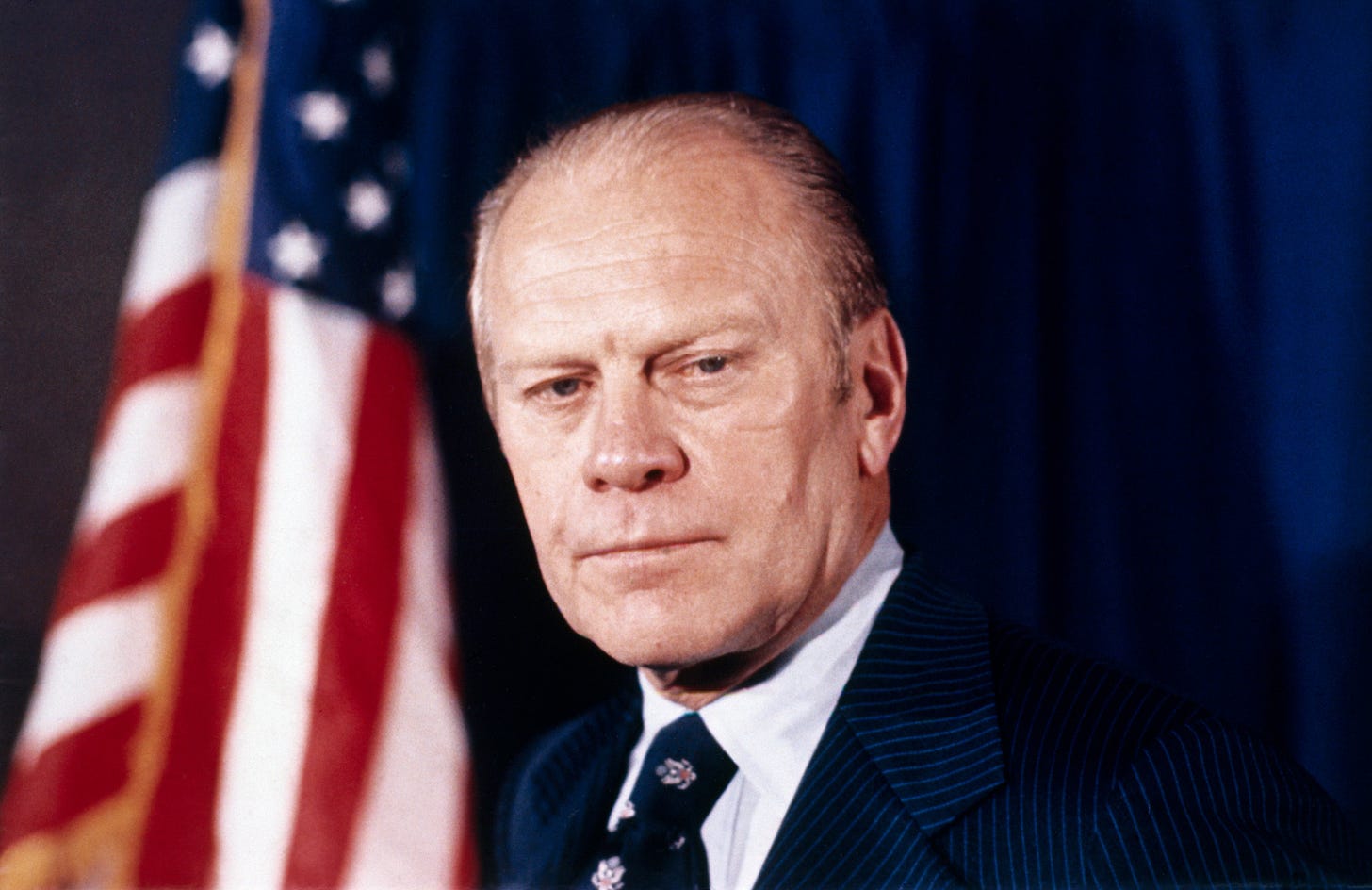Death of the Last RINO President
Or more precisely, the last President from what we once called the "Rockefeller Republicans".
by Rod D. Martin
January 2, 2007
Many others have said plenty this week about Gerald Ford’s virtues, and about them there is surely much to be said. But perhaps the most significant thing for conservatives to note is that Ford was the last RINO (Republican In Name Only) President; or more precisely, the last President from the Party’s Rockefeller Republican wing.
That distinction is worth making, because in Ford’s case “RINO” is an anachronism, only valid from our point of view today. And the fact that this can be said is illustrative of a change too many conservatives have forgotten.
When Gerald Ford occupied the White House, what we call RINOs were the Republican Party: not merely socially liberal but socially uninterested, Keynesian in their economics (the man who made Ford President, Richard Nixon, famously said “we are all Keynesians now”, the point at which more than a few free market economists have opined that they knew that they were not), and accommodationist in their foreign policy.
They were the majority, these establishment forebears of Christie Whitman and Lincoln Chafee, at least within their own party. Conservatives, by contrast, were completely disenfranchised. They were the defeated Goldwater remnant within the GOP, the “Yellow Dogs” clinging to a Democratic Party already captured by the Red Diaper Baby left, or the majority of Evangelicals, refusing to vote at all. In no case did they have an effective voice — in either party, on virtually any issue — which could meaningfully hope to carry the day, ever.
The Ford Presidency embodied this perfectly.
Ford was staunchly pro-abortion, and vocally so to the day of his death: he, like his once-upon-a-time Southern Baptist successor Jimmy Carter, could have effectively fought Roe and possibly even overturned it; he simply had no wish to. He, like his successor, was a tax-hiker: his one tax cut, trumpeted by his friends in recent days, was intentional Keynesian fine-tuning. It was certainly not the supply-side sea change Laffer first proposed to Ford’s men Cheney and Rumsfeld (men who became converts though their President did not) and which could have averted the Carter era’s double digit inflation, interest rates and unemployment.
And of course no one has chronicled Ford’s Chamberlainesque groveling to the Soviets better than the great Phyllis Schlafly, in her Ambush at Vladivostok: A white flag-waving Democrat Congress notwithstanding (however much it might rightly be blamed for tragedies from the fall of Saigon and Phnom Pehn to the failure of Americans to stop the Cuban invasion of Angola), Ford’s inept continuation of Nixon’s détanté started America down the slippery slope which ultimately led to the loss of 26 countries to Communism by the end of the Carter Presidency.
It took Ronald Reagan to change all this. But the key point for modern conservatives to note is that Reagan did stop it, and indeed transformed the situation entirely. The stirrings of change were already present: Reagan nearly wrested the Republican nomination from sitting-President Jerry Ford in 1976. But his triumph in 1980 — first in the Party, then in the nation — represented the beginning of the end of the northeastern establishment’s dominance of the Republican Party, and the beginning of the popular conservatism which has spread broad and deep ever since.
Disheartened Republicans would do well to remember. The failure of conservatives to nominate Reagan in 1976 did not mean it was time to fold the tents and go home: it meant that the time had come to redouble efforts, recruit new converts, and press the near-victory of ‘76 on to its logical conclusion.
Then as now, the whole world was at stake. The Soviets were then at the gates; al Qaeda seeks daily to find ways through them now, with China and others growing stronger every day. Roe remains on the books yet is again close to defeat, with the most pro-abortion justice — Ford appointee John Paul Stevens — reported ill. A Democrat Presidential candidate looms who makes Carter look conservative: she has already attempted to nationalize nearly one fifth of the U.S. economy (in the name of better health care), at just the moment when free market health reforms are making high quality care accessible to more people than ever, and when socialism has been shown to create more oppression, more suffering and more poverty than any other system man has devised.
A reinvigorated, recommitted conservative movement must consolidate its strength in the Republican Party and drive on to new, greater victories. Everything hangs in the balance.
The death of Jerry Ford symbolizes the defeat of an entire worldview, and the takeover of one of America’s two great parties by the nation’s heretofore disenfranchised conservative majority. As in Canaan, the conquest has gone slowly, and the work has been imperfect. But the workers must not tire: the task must be completed.
For now more than ever, victory — civilization-changing victory — is within our reach.
— This essay originally posted at Human Events.



